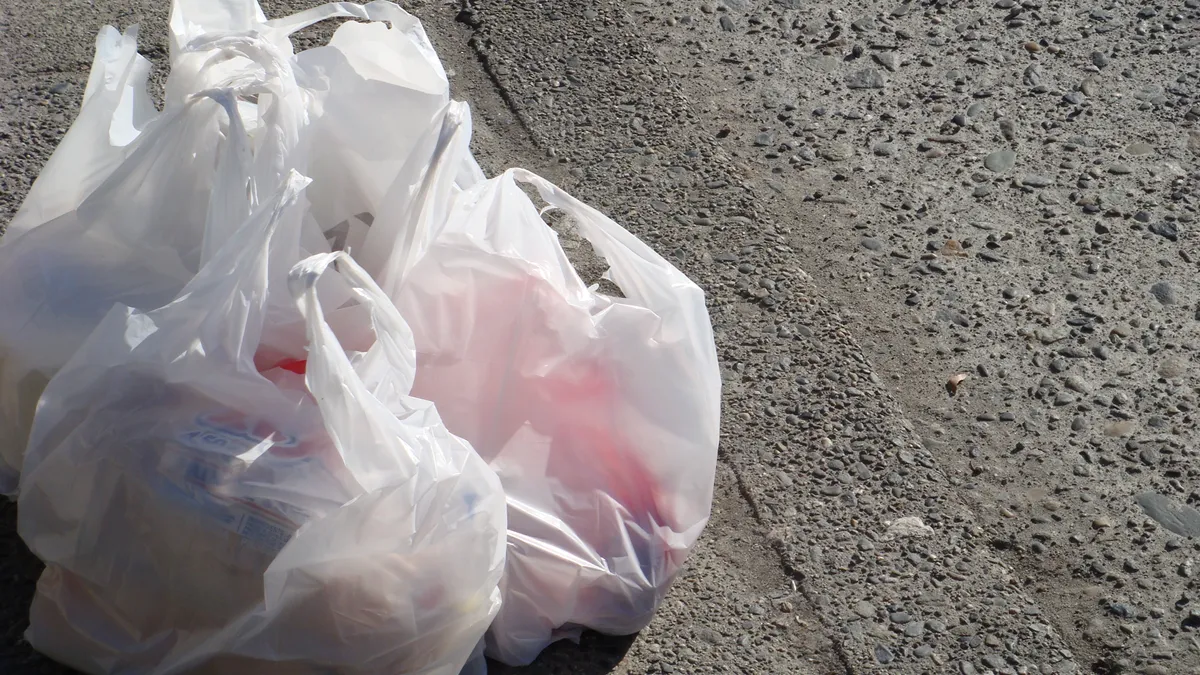UPDATE: Nov. 4, 2020: New Jersey Gov. Phil Murphy signed S864 into law today, with new bans on select plastic products and paper bags set to take effect in May 2022. The governor did not change his position in the face of calls for a veto by plastic and paper industry representatives, with his office saying in a release that "plastic bags are one of the most problematic forms of garbage," "paper bags require resources and energy to produce, contributing to pollution" and reusable bags are the state's focus going forward.
Dive Brief:
- Both chambers of the New Jersey state legislature passed a broad bill (S864) yesterday that would ban or limit the distribution of single-use plastic carryout bags, single-use paper carryout bags, polystyrene foam food service products and single-use plastic straws.
- The plastic bag policy would apply to any "store or food service business," while the paper bag policy would specifically apply to larger "grocery stores" of a certain size. Polystyrene foam food service product limitations would apply to any "food service business" or person selling food. All policies would take effect within 18 months of the bill's final approval, with additional foam products phased in later. The straws on request policy would start within one year.
- A Plastics Advisory Council would be established within the state's Department of Environmental Protection to evaluate the policy's effectiveness and study "various issues related to single-use plastics." Additionally, $500,000 would be appropriated annually, for three years, from an existing cleanup fund to help DEP launch a statewide education campaign and distribute free reusable carryout bags.
Dive Insight:
The bill has been described as one of the most comprehensive of its kind in the United States, achieving a trifecta of limitations on the increasingly popular targets of bags, polystyrene foam and straws.
In addition to its wide scope, the bill's passage is notable in a year of significant waste-related policy activity for New Jersey. Long-debated laws on organics recycling and environmental justice have passed this year, and a recycled content bill made it out of committee in the Assembly earlier this month.
While this latest bill had been gaining signs of support in recent weeks, its final passage took some local observers by surprise and was hailed as a victory by numerous environmental groups. Multiple sources indicate the legislation experienced significant opposition from packaging and food retail trade groups ahead of its passage, and while some were awaiting the final version to be shared publicly, it appears no notable surprise amendments were included. Precise language around what constitutes a reusable bag – one with "stitched handles" rather than a thicker version of standard plastic bags – as well as other specifications about covered packaging types remained intact.
The overall emphasis on reducing plastics that are challenging to handle in traditional recycling systems is seen as a boon for local municipalities dealing with litter challenges, as well as MRF operators affected by plastic bags clogging up their equipment.
"Plastics are a problem for recycling facilities and for litter and the environment," said Marie Kruzan, executive director of the Association of New Jersey Recyclers, adding education will be key to driving a tangible change in consumer behavior around proper recycling. "It's going to help us, it's not going to solve it – yet."
The inclusion of a limitation on paper carryout bags was made to appease food retailers concerned they could end up spending more to provide paper bags if only plastic options went away, and New Jersey would be the first state to finalize such a move. In a statement, American Forest & Paper Association CEO Heidi Brock asked Gov. Phil Murphy to issue a conditional veto that removes the paper language, saying the legislature had "undermined an environmentally responsible option for consumers" and sent an "alarming message" by potentially affecting related jobs in the state.
The American Chemistry Council (ACC) opposed the measure for other reasons, but similarly called for Murphy to veto it. "New Jersey should amend the bill by dropping the polystyrene foam ban and allowing the Plastics Advisory Council to do its job, providing recommendations to the legislature on plastic packaging policies which help New Jersey residents," said Omar Terrie, director of ACC's Plastics Foodservice Packaging Group, in a statement.
Murphy's office said the governor supports the bill, according to multiple reports following the vote. Doug O'Malley, director of advocacy group Environment New Jersey, believes Murphy will sign it. He pointed to the more than 50 local policies in place throughout the state as a "citizen's movement" that policymakers have recognized. O'Malley also cited Murphy's veto of a related 2018 bill creating fees for single-use carryout bags, which the governor said did not go far enough, as another relevant factor.
“It would not have changed the way people approach the checkout counter," he said of the prior bill. "Now it's not 'paper or plastic?' It’s 'can I have your reusable bag?'"
If the bill is signed, New Jersey will become the ninth state to have a comprehensive or de facto plastic bag policy. While the enactment of some state and local policies has been delayed due to the pandemic, the majority are now back on track with multiple taking effect this fall or next year. New Jersey would also become the fifth state to ban polystyrene foam in some form (following New York's move earlier this year) and one of a smaller group of states to limit straw usage.











